- Home
- Nick Hornby
31 Songs Page 14
31 Songs Read online
Page 14
Needle in a Haystack, The Velvelettes
From The Best of The Velvelettes. They did the original version of ‘He Was Really Saying Something’, also on this compilation.
Let’s Straighten it Out, O.V. Wright
Available on The Complete O. V Wright on Hi Records Vol. 1, a double CD that is pretty much all good, if you can stand the whistling teeth. You can find Latimore’s original version, with its long, moody organ intro, on Straighten It Out: The Best of Latimore.
Röyksopp’s Night Out, Röyksopp
From the album Melody A.M. The Gotan Project’s La Revancha Del Tango is the best and most innovative ambient album I’ve heard – even its Starbucks-y ubiquity hasn’t entirely ruined it for me yet.
Frontier Psychiatrist, the Avalanches
From the album Since I Left You.
No Fun/Push It, Soulwax
From the album Too Many DJs, although this particular track is also on a (bootleg?) album called The Best Bootleg Album in the World … Ever!, which you can find in the better class of independent CD shops.
Pissing in a River, the Patti Smith Group
From the album Radio Ethiopia. Land (2002) anthologizes just about everything you’d want – including this track – on a two-CD set.
Picture credits
page 2 Teenage Fanclub, playing live at the launch for Speaking with the Angel in April 2001. It was an evening of music and performance at the Hammersmith Palais, with all proceeds from the evening going to The Treehouse Trust. Photo Simon Weller. page 8 Bruce Springsteen performing live in Amsterdam, 1993. Photo Paul Bergen / Redferns. pages 18–19 Ridley Road Market, Streets of Dalston, by Cairo Sealey. page 24 Led Zeppelin performing at Madison Square Garden, New York, 1977. Photo Michael Putland / Retna. page 30 Photo of Rufus Wainwright by James Burns / Camera Press. page 34 Santana performing live in Los Angeles, 1969. Photo Robert Knight / Redferns. page 38 Rod Stewart in his pyjamas, London 1974. Photo Ian Dickson / Redferns. page 44 A selection of Bob Dylan album covers: Bringing it All Back Home, Blonde on Blonde, Blood On The Tracks, At Budokan, The Times They Are A Changin’ and Desire. Reproduced courtesy of Columbia Records, page 52 Ani DiFranco, photo by Karen Robinson. The photo was featured on the front cover of Ani DiFranco’s album Like I Said. Thanks to Righteous Babe Records, page 62 Paul Westerberg performing live in London. Photo Patrick Ford / Redferns. page 70 Suicide performing in New York, 1980. Photo Ebet Roberts / Redferns. page 77 the J. Geils Band performing in London, 1973. Photo Dave Ellis / Redferns. page 85 ‘Smoke’, written by Ben Folds and Anna Goodman, 1997 Sony/ATV Songs / Annabanana Songs BMI. page 94 Badly Drawn Boy on the roof of the Radisson Edwardian Hotel, Leicester Square, London, taken early summer 2002. Photo by Steve Double. page 102 The Bible, South Bank, London, late 1980s. Photo Richard Croft/Retna.
page 110 Van Morrison performing live in London, 1996. Photo David Redfern / Redferns. page 116 Haggle Vinyl, Essex Road, Islington. Photo John Hamilton, page 122 Danny’s tape player, courtesy of Dad. page 128 Ian Dury and the Blockheads logo, reproduced with thanks to EMI. pages 136–137 Jackson Browne photographed in an antique Chevy Bel Air, Hollywood, California, in July 1974. Photo Henry Diltz/Corbis. page 144 Record shop ‘Wood’, Cross Street, Islington. Photo John Hamilton. page 151 The Velvelettes in the mid 1960s. Photo Michael Ochs Archive / Redferns. page 157 O.V. Wright’s album The Bottom Line released 1978, featuring ‘Let’s Straighten it Out’. Reproduced by permission of Cream Records, by courtesy of Demon Music Group Ltd. page 162 Röyksopp’s Svein Berge and Torbjorn Brundtland near Bergen, Norway, just before Christmas a couple of years ago. The photo appears on their 2001 album Melody A.M. Photo Marte Rognerud. Thanks to Svein and Torbjorn. page 169 Stephen and David Dewaele in their favourite record shop in Ghent, Belgium, March 2002. Photo by Eva Vermandel. page 175 Patti Smith performing live at the Union Chapel in Islington, 2 August 2002. Photo Gordon Comstock. page 182 Aimee Mann. Photo Anthony St James / Retna. page 191 Steve Earle. Photo Dennis Kleiman / Retna UK. page 200 Los Lobos. Photo Glenn A. Baker / Redferns. page 211 Nick Cave. Photo Simon Leigh / Camera Press.
Every effort has been made to trace copyright holders and we apologize in advance for any unintentional omission. We would be pleased to insert the appropriate acknowledgement in any subsequent edition.
Thanks to: Amanda Posey, Dave Eggers, Tony Lacey, Kle, Eli Horowitz and David Remnick.
If you would like to...
Turn the page for an extract of
Funny Girl,
the brand new novel from Nick Hornby
Nick Hornby
FUNNY GIRL
1
She didn’t want to be a beauty queen, but as luck would have it, she was about to become one.
There were a few aimless minutes between the parade and the announcement, so friends and family gathered round the girls to offer congratulations and crossed fingers. The little groups that formed reminded Barbara of liquorice Catherine wheels: a girl in a sugary bright pink or blue bathing suit at the centre, a swirl of dark brown or black raincoats around the outside. It was a cold, wet July day at the South Shore Baths, and the contestants had mottled, bumpy arms and legs. They looked like turkeys hanging in a butcher’s window. Only in Blackpool, Barbara thought, could you win a beauty competition looking like this.
Barbara hadn’t invited any friends, and her father was refusing to come over and join her, so she was stuck on her own. He was just sat there in a deckchair, pretending to read the Daily Express. The two of them would have made a tatty, half-eaten Catherine wheel, but even so, she would have appreciated the company. In the end, she went over to him. Leaving the rest of the girls behind made her feel half-naked and awkward, rather than glamorous and poised, and she had to walk past a lot of wolf-whistling spectators. When she reached her father’s spot at the shallow end, she was probably fiercer than she wanted to be.
‘What are you doing, Dad?’ she hissed.
The people sitting near him, bored, mostly elderly holiday-makers, suddenly went rigid with excitement. One of the girls! Right in front of them! Telling her father off!
‘Oh, hello, love.’
‘Why wouldn’t you come and see me?’
He stared at her as if she’d asked him to name the mayor of Timbuktu.
‘Didn’t you see what everyone else was doing?’
‘I did. But it didn’t seem right. Not for me.’
‘What makes you so different?’
‘A single man, running… amok in the middle of a lot of pretty girls wearing not very much. I’d get locked up.’
George Parker was forty-seven, fat, and old before he had any right to be. He had been single for over ten years, ever since Barbara’s mother had left him for her manager at the tax office, and she could see that if he went anywhere near the other girls he’d feel all of these states acutely.
‘Well, would you have to run amok?’ Barbara asked. ‘Couldn’t you just stand there, talking to your daughter?’
‘You’re going to win, aren’t you?’ he said.
She tried not to blush, and failed. The holidaymakers within ear-shot had given up all pretence of knitting and reading the papers now. They were just gawping at her.
‘Oh, I don’t know. I shouldn’t think so,’ she said.
The truth was that she did know. The mayor had come over to her, whispered ‘Well done’ in her ear, and patted her discreetly on the bottom.
‘Come off it. You’re miles prettier than all the others. Tons.’
For some reason, and even though this was a beauty contest, her superior beauty seemed to irritate him. He never liked her showing off, even when she was making her friends and family laugh with some kind of routine in which she portrayed herself as dim or dizzy or clumsy. It was still showing off. Today, though, when showing off was everything, the whole point, she’d have thought he might forgive her, but no such luck. If you had to go and enter a beauty pageant, he seemed to be saying, you might at least have the good manners to look
uglier than everyone else.
She pretended to hear parental pride, so as not to confuse her audience.
‘It’s a wonderful thing, a blind dad,’ she said to the gawpers. ‘Every girl should have one.’
It wasn’t the best line, but she’d delivered it with a completely straight face, and she got a bigger laugh than she deserved. Sometimes surprise worked and sometimes people laughed because they were expecting to. She understood both kinds, she thought, but it was probably confusing to people who didn’t take laughter seriously.
‘I’m not blind,’ said George flatly. ‘Look.’
He turned around and widened his eyes at anyone showing any interest.
‘Dad, you’ve got to stop doing that,’ said Barbara. ‘It frightens people, a blind man goggling away.’
‘You…’ Her father pointed rudely at a woman wearing a green mac. ‘You’ve got a green mac on.’
The old lady in the next deckchair along began to clap, uncertainly, as if George had just that second been cured of a lifelong affliction, or was performing some kind of clever magic trick.
‘How would I know that, if I was blind?’
Barbara could see that he was beginning to enjoy himself. Very occasionally he could be persuaded to play the straight man in a double act, and he might have gone on describing what he could see for ever, if the mayor hadn’t stepped up to the microphone and cleared his throat.
It was Auntie Marie, her father’s sister, who suggested that she should go in for Miss Blackpool. Marie came round for tea one Saturday afternoon, because she happened to be passing, and casually dropped the competition into the conversation, and – a sudden thought – asked her why she’d never had a go, while her dad sat there nodding his head and pretending to be thunderstruck by the brilliance of the idea. Barbara was puzzled for the first minute or two, before she realized that the two of them had cooked up a plan. The plan, as far as she could work out, was this: Barbara entered the pageant, won it and then forgot all about moving to London, because there’d be no need. She’d be famous in her own hometown, and who could want for more? And then she could have a go at Miss UK, and if that didn’t work out she could just think about getting married, when there would be another coronation, of sorts. (And that was a part of the beauty pageant plan too, Barbara was sure. Marie was quite sniffy about Aidan, thought she could do much better, or much richer, anyway, and beauty queens could take their pick. Dotty Harrison had married a man who owned seven carpet shops, and she’d only come third.)
Barbara knew she didn’t want to be queen for a day, or even for a year. She didn’t want to be a queen at all. She just wanted to go on television and make people laugh. Queens were never funny, not the ones in Blackpool anyway, or the ones in Buckingham Palace either. She’d gone along with Auntie Marie’s scheme, though, because Dorothy Lamour had been Miss New Orleans and Sophia Loren had been a Miss Italy runner-up. (Barbara had always wanted to see a photograph of the girl who had beaten Sophia Loren.) And she’d gone along with it because she was bursting to get on with her life, and she needed something, anything, to happen. She knew she was going to break her father’s heart, but first she wanted to show him that she’d at least tried to be happy in the place she’d lived all her life. She’d done what she could. She’d auditioned for school plays, and had been given tiny parts, and watched from the wings while the talentless girls that the teachers loved forgot their lines and turned the ones they remembered into nonsense. She’d been in the chorus line at the Winter Gardens, and she’d gone to talk to a man at the local amateur dramatic society who’d told her that their next production was The Cherry Orchard, which ‘probably wouldn’t be her cup of tea’. He asked whether she’d like to start off selling tickets and making posters. None of it was what she wanted. She wanted to be given a funny script so that she could make it funnier.
She wished that she could be happy, of course she did; she wished she wasn’t different. Her school friends and her colleagues in the cosmetics department at R. H. O. Hills didn’t seem to want to claw, dig, wriggle and kick their way out of the town like she did, and sometimes she ached to be the same as them. And wasn’t there something a bit childish about wanting to go on television? Wasn’t she just shouting, ‘Look at me! Look at me!’ like a two-year-old? All right, yes, some people, men of all ages, did look at her, but not in the way that she wanted them to look. They looked at her blonde hair and her bust and her legs, but they never saw anything else. So she’d enter the competition, and she’d win it, and she was dreading the look in her father’s eyes when he saw that it wasn’t going to make any difference to anything.
The mayor didn’t get around to it straight away, because he wasn’t that sort of man. He thanked everyone for coming, and he made a pointless joke about Preston losing the Cup Final, and a cruel joke about his wife not entering this year because of her bunions. He said that the bevy of beauties in front of him – and he was just the sort of man who’d use the expression ‘bevy of beauties’ – made him even prouder of the town than he already was. Everyone knew that most of the girls were holidaymakers from Leeds and Manchester and Oldham, but he got an enthusiastic round of applause at that point anyway. He went on for so long that she began to try and estimate the size of the crowd by counting the heads in one row of deckchairs and then multiplying by the number of rows, but she never finished because she got lost in the face of an old woman with a rain hat and no teeth, grinding a piece of sandwich over and over again. That was another ambition Barbara wanted to add to the already teetering heap: she wanted to keep her teeth, unlike just about every one of her relatives over the age of fifty. She woke up just in time to hear her name, and to see the other girls pretending to smile at her.
She didn’t feel anything. Or rather, she noted her absence of feeling and then felt a little sick. It would have been nice to think that she’d been wrong, that she didn’t need to leave her father and her town, that this was a dream come true and she could live inside it for the rest of her life. She didn’t dare dwell on her numbness in case she came to the conclusion that she was a hard and hateful bitch. She beamed when the mayor’s wife came over to put the sash on her, and she even managed a smile when the mayor kissed her on the lips, but when her father came over and hugged her she burst into tears, which was her way of telling him that she was as good as gone, that winning Miss Blackpool didn’t even come close to scratching the itch that plagued her like chickenpox.
She’d never cried in a bathing suit before, not as a grown woman anyway. Bathing suits weren’t for crying in, what with the sun and the sand and the shrieking and the boys with their eyes out on stalks. The feeling of wind-chilled tears running down her neck and into her cleavage was peculiar. The mayor’s wife put her arms around her.
‘I’m all right,’ said Barbara. ‘Really. I’m just being silly.’
‘Believe it or believe it not, I know how you’re feeling,’ said the mayor’s wife. ‘This is how we met. Before the war. He were only a councillor then.’
‘You were Miss Blackpool?’ said Barbara.
She tried to say it in a way that didn’t suggest amazement, but she wasn’t sure she’d managed. The mayor and his wife were both large, but his size seemed intentional somehow, an indication of his importance, whereas hers seemed like a terrible mistake. Perhaps it was just that he didn’t care and she did.
‘Believe it or believe it not.’
The two women looked at each other. These things happened. There was no need to say anything else, but then the mayor came over to them and said something else anyway.
‘You wouldn’t think so to look at her,’ said the mayor, who was not a man to let the unspoken stay that way.
His wife rolled her eyes at him.
‘I’ve already said “believe it or believe it not” twice. I’ve already admitted that I’m no Miss Blackpool any more. But you have to come clomping in anyway.’
‘I didn’t hear you say “believe it or believe it not”
.’
‘Well I did. Twice. Didn’t I, love?’
Barbara nodded. She didn’t really want to be drawn in, but she thought she could offer the poor woman that much at least.
‘Kiddies and cream buns, kiddies and cream buns,’ said the mayor. ‘Well, you’re no oil painting,’ his wife said.
‘No, but you didn’t marry me because I was an oil painting.’
His wife thought about this and conceded the point with silence. ‘Whereas that was the whole point of you,’ said the mayor. ‘You were an oil painting. Anyways,’ he said to Barbara. ‘You know this is the biggest open-air baths in the world, don’t you? And this is one of the biggest days here, so you’ve every right to feel overcome.’
Barbara nodded and snuffled and smiled. She wouldn’t have known how to begin to tell him that the problem was exactly the opposite of the one he’d just described: it was an even smaller day than she feared it would be.
‘That bloody Lucy woman,’ her father said. ‘She’s got a lot to answer for.’
The mayor and his wife looked confused, but Barbara knew who he was talking about. She felt understood, and that made it worse.
Barbara had loved Lucille Ball ever since she saw I Love Lucy for the first time: everything she felt or did came from that. The world seemed to stand still for half an hour every Sunday, and her father knew better than to try and talk to her or even to rustle the paper while the programme was on, in case she missed something. There were lots of other funny people she loved: Tony Hancock, Sergeant Bilko, Morecambe and Wise. But she couldn’t be them even if she’d wanted to. They were all men. Tony, Ernie, Eric, Ernie … There was nobody called Lucy or Barbara in that lot. There were no funny girls.
‘It’s just a programme,’ her father would say, before or after but never during. ‘An American programme. It’s not what I call British humour.’

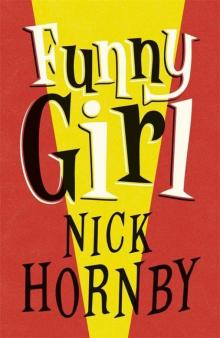 Funny Girl
Funny Girl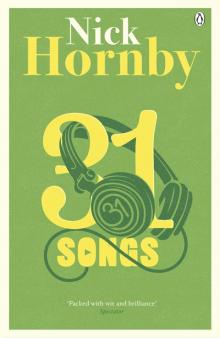 31 Songs
31 Songs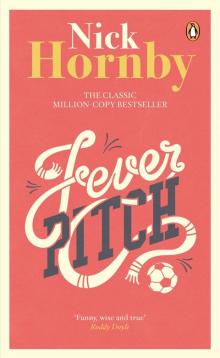 Fever Pitch
Fever Pitch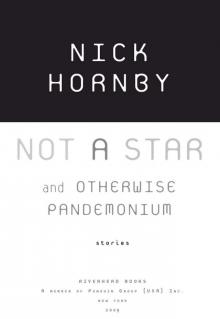 Not a Star and Otherwise Pandemonium
Not a Star and Otherwise Pandemonium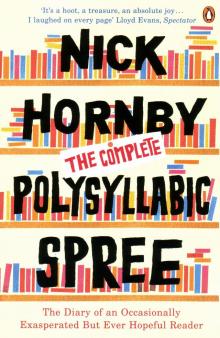 The Complete Polysyllabic Spree
The Complete Polysyllabic Spree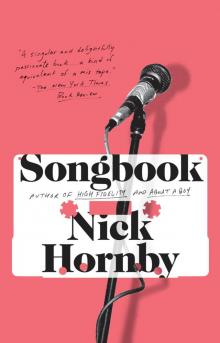 Songbook
Songbook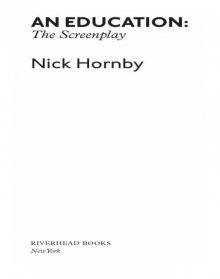 An Education
An Education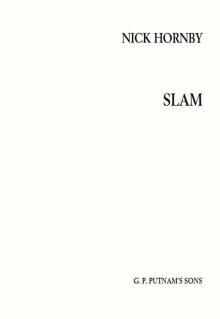 Slam
Slam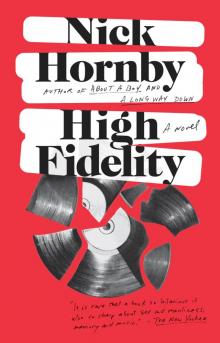 High Fidelity
High Fidelity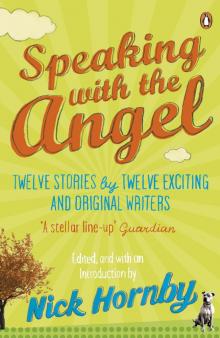 Speaking With the Angel
Speaking With the Angel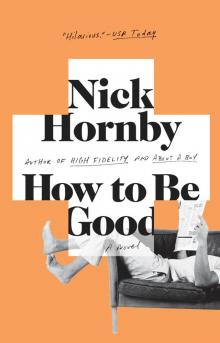 How to Be Good
How to Be Good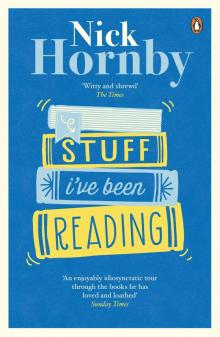 Stuff I've Been Reading
Stuff I've Been Reading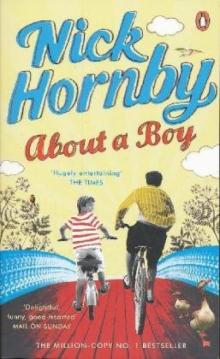 About a Boy
About a Boy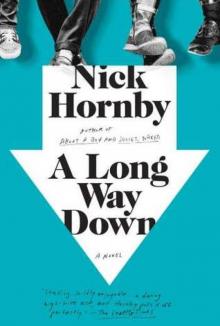 A Long Way Down
A Long Way Down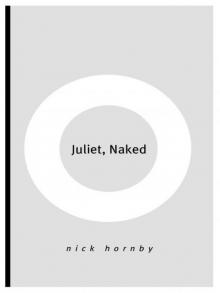 Juliet, Naked
Juliet, Naked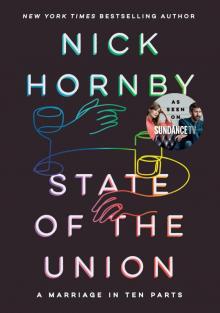 State of the Union
State of the Union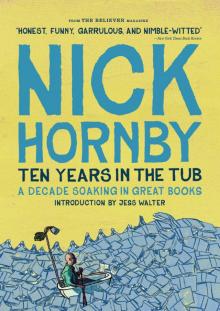 Ten Years in the Tub: A Decade Soaking in Great Books
Ten Years in the Tub: A Decade Soaking in Great Books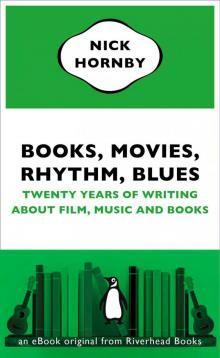 Books, Movies, Rhythm, Blues: Twenty Years of Writing About Film, Music and Books
Books, Movies, Rhythm, Blues: Twenty Years of Writing About Film, Music and Books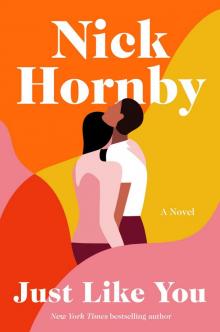 Just Like You
Just Like You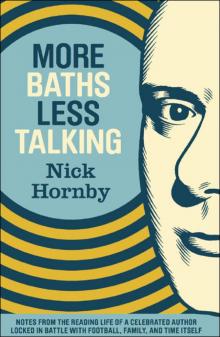 More Baths Less Talking
More Baths Less Talking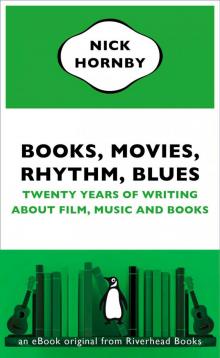 Books, Movies, Rhythm, Blues
Books, Movies, Rhythm, Blues